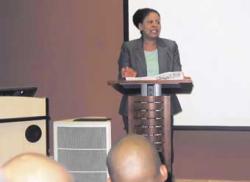| Monday, February 4, 2008 - The Daily Advance |
Panel Discussion:
“Major African-American Contributors in
Mathematics, Science and Technology”
Article from The Daily Advance - Elizabeth City, NC |
ECSU profs identify black pioneers of influence
Campus Celebrating Black History Month
By ZAC GOLDSTEIN
Staff Writer – The Daily Advance
Tuesday, February 05, 2008
From flying combat missions in World War II to developing glaucoma treatments, African-Americans who contributed to math, science and technology were honored Monday at Elizabeth City State University.
The honors coincided with the start of Black History Month and ECSU's fourth annual School of Mathematics Science and Technology Research Week. Through Friday, the university will host a series of seminars, talks and presentations.

STAFF PHOTO BY ZAC GOLDSTEIN
|
Cynthia Warrick, dean of Elizabeth City State University's School of Mathematics, Science and Technology, speaks during a panel discussion on the contributions of African-Americans to science and math, at ECSU Monday.
|
At Monday's event, ECSU professors paid homage to those who influenced them professionally.
Farrah Chandler, professor of mathematics and computer science, recognized Etta Falconer and David Blackwell, the first African-American member of the National Academy of Sciences. He was a statistician who helped develop war game theory during the Cold War.
Falconer, whose focus was algebra, taught for many years at Spelman and Norfolk State colleges.
"She was responsible for the overhaul at Spelman from kind of a liberal arts college to producing a lot of women in science," Chandler said.
Anthony Sharp, director of ECSU's aviation technology program, honored Gen. Benjamin O. Davis Jr., a great aviator and social pioneer as well.
"In essence, he was a Martin Luther King in his own right," Sharp said.
Despite facing isolation as the only black student at West Point, Davis graduated and went on to become a fighter pilot. As commander of the Tuskegee Airmen during World War II, he helped prove that African-Americans could be successful aviators, Sharp said.
Anthony Emekalam, assistant professor of pharmacy, pointed to the achievements of Percy Julian. The grandson of slaves, Julian had success synthesizing medicine from plant materials and held over 100 patents. Emekalam credited him with making Cortisone affordable and for laying the groundwork for birth control pills and drugs used in organ transplant.
"It is mind-blowing what these people can accomplish when the odds were against them," he said.
Josiah Sampson, visiting assistant professor of biology, said he could not point to one particular black scientist who influenced him. He said it was too difficult to pick from the likes of Charles Drew, blood transfusion pioneer, and Mark Dean, inventor and computer scientist, as well as a generation of upcoming scientists.
"We continue to watch the fading from view of the black scientist," he said. "As black scientists, we cannot choose and decide to not see each other." |
|
| |
|
